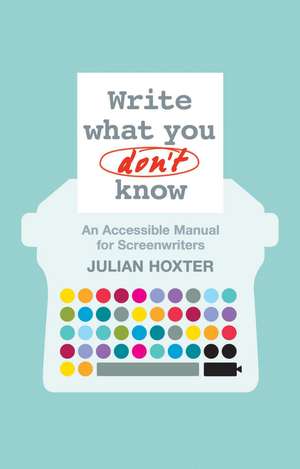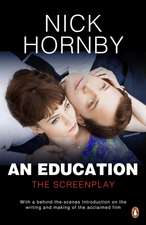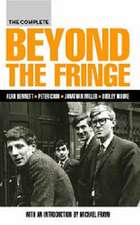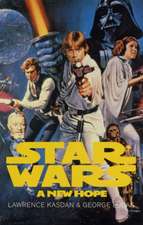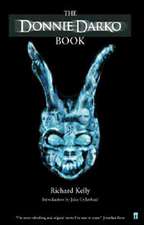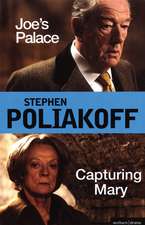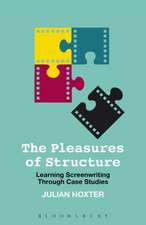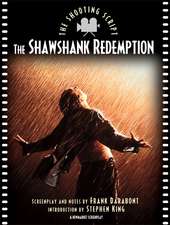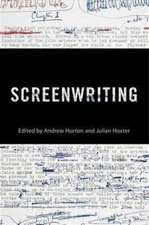Write What You Don't Know: An Accessible Manual for Screenwriters
Autor Julian Hoxteren Limba Engleză Paperback – 19 oct 2011
Preț: 174.07 lei
Preț vechi: 200.42 lei
-13% Nou
Puncte Express: 261
Preț estimativ în valută:
33.31€ • 34.65$ • 27.50£
33.31€ • 34.65$ • 27.50£
Carte tipărită la comandă
Livrare economică 14-28 aprilie
Preluare comenzi: 021 569.72.76
Specificații
ISBN-13: 9781441102102
ISBN-10: 1441102108
Pagini: 296
Dimensiuni: 138 x 216 x 18 mm
Greutate: 0.43 kg
Editura: Bloomsbury Publishing
Colecția Continuum
Locul publicării:New York, United States
ISBN-10: 1441102108
Pagini: 296
Dimensiuni: 138 x 216 x 18 mm
Greutate: 0.43 kg
Editura: Bloomsbury Publishing
Colecția Continuum
Locul publicării:New York, United States
Caracteristici
Author has taught film in both the UK and US, and has a very good handle on what students are looking for
Notă biografică
Julian Hoxter is the Screenwriting Coordinator and Assistant Professor of Screenwriting in the Cinema Department of San Francisco State University. He is an award winning educator and filmmaker whose films have been shown in festivals around the world. He has taught screenwriting and filmmaking in the US and the UK for over 15 years.
Cuprins
Introduction: Oh joy, another screenwriting book
- Top ten tasks that are more important for a new screenwriter than reading this book 1. What's it all about?
- How movies work, only without the complicated bits
- "Write what you know": why this idea sucks and what to do about it
2. Screenwriting: the hardest easy thing you will ever do
- Kind of a pep talk: you should write a movie
- Bad reasons to write a screenplay
- Good reasons to write a screenplay
- Ideas and where the pesky things hide
- Learning something new: the joys of research. Yes, really.
3. Screenwriting is For the Birds: A simple model for cinematic storytelling
- Story worlds: their creation and destruction
- The 'V': Build a world, break it and then fix it again
- Plots and stories: why everything comes from character
4. It's all about the concept
- The theme
- The premise
- The pitch statement
- What is a screenplay and how do I get there?
- The treatment
- The screenplay
5. "Taming wild words": It's all about the structure
- What structure is for and where it comes from
- Narration: positioning your audience
- Exposition
- Acting it all out
- The 'W' model of screenplay structure: acts and angles
- Beating it up
- The 'W' Beat Sheets
- Making a scene
- Case study: scene beats in Juno
6. Case Study: Brick in the 'W'
7. It's all about the characters: this time I really mean it
- Character development, or why writing a character bio is often a waste of ink
- The 'C Team'
8. Dialogue is not just people talking
- Movie dialogue is dynamic - except when it isn't
9. OK, what now?
- Top ten tasks that are more important for a new screenwriter than reading this book 1. What's it all about?
- How movies work, only without the complicated bits
- "Write what you know": why this idea sucks and what to do about it
2. Screenwriting: the hardest easy thing you will ever do
- Kind of a pep talk: you should write a movie
- Bad reasons to write a screenplay
- Good reasons to write a screenplay
- Ideas and where the pesky things hide
- Learning something new: the joys of research. Yes, really.
3. Screenwriting is For the Birds: A simple model for cinematic storytelling
- Story worlds: their creation and destruction
- The 'V': Build a world, break it and then fix it again
- Plots and stories: why everything comes from character
4. It's all about the concept
- The theme
- The premise
- The pitch statement
- What is a screenplay and how do I get there?
- The treatment
- The screenplay
5. "Taming wild words": It's all about the structure
- What structure is for and where it comes from
- Narration: positioning your audience
- Exposition
- Acting it all out
- The 'W' model of screenplay structure: acts and angles
- Beating it up
- The 'W' Beat Sheets
- Making a scene
- Case study: scene beats in Juno
6. Case Study: Brick in the 'W'
7. It's all about the characters: this time I really mean it
- Character development, or why writing a character bio is often a waste of ink
- The 'C Team'
8. Dialogue is not just people talking
- Movie dialogue is dynamic - except when it isn't
9. OK, what now?
Recenzii
Julian Hoxter's Write What You Don't Know is an authentic standout among the growing number of titles treating screenwriting education. The book is fresh, often funny, always insightful, and enormously affirming not only for screenwriters but for all people who love worthy film and literature. The book is written in a language that is accessible and engaging and clear as light. At the same time as it engages the reader at every turn, it continually posits profound insights into the nature of creative expression in all its forms. --Professor Richard Walter, UCLA Screenwriting Chair
A priceless antidote to illusory ideas about a greed and glory industry: honesty and self-exploration by the writer. Hoxter urges us to avoid cliches, formulas and conventions by exploring those things that enlarge our own understanding of the world. Coupled with witty "how to" advice, the book's approach is personal, distinct and entirely to the point. --Bill Nichols, Professor of Cinema at San Francisco State University, and author of Engaging Cinema, Introduction to Documentary (2nd edition) and Representing Reality
Laughing as you learn is an uncommon delight. Julian Hoxter is a witty writer and supremely wise teacher of screenwriting. Reading this bountiful, often rollicking guide to the craft will leave any reader, of any age, geared up and ready to write smart and lively movies. If you aspire to become a screenwriter, this provocative and original book will open the creative door for you. -- Joseph McBride, cowriter of Rock 'n' Roll High School and author of Writing in Pictures: Screenwriting Made (Mostly) Painless
A neat - and blessedly simple - new approach to screenplay structure. Storytelling has always been about the W: what, who, where, why when. Here's another W that ensures they all hang together neatly to make a saleable screenplay. --Nicola Lees, Author, Greenlit: Developing Factual/Reality TV Ideas From Concept to Pitch
This is a practical how-to book for anyone interested in turning an idea into a working screenplay. Hoxter, a professor of cinema at San Francisco State University, is a working screenwriter who blogs about the biz.
A priceless antidote to illusory ideas about a greed and glory industry: honesty and self-exploration by the writer. Hoxter urges us to avoid cliches, formulas and conventions by exploring those things that enlarge our own understanding of the world. Coupled with witty "how to" advice, the book's approach is personal, distinct and entirely to the point. --Bill Nichols, Professor of Cinema at San Francisco State University, and author of Engaging Cinema, Introduction to Documentary (2nd edition) and Representing Reality
Laughing as you learn is an uncommon delight. Julian Hoxter is a witty writer and supremely wise teacher of screenwriting. Reading this bountiful, often rollicking guide to the craft will leave any reader, of any age, geared up and ready to write smart and lively movies. If you aspire to become a screenwriter, this provocative and original book will open the creative door for you. -- Joseph McBride, cowriter of Rock 'n' Roll High School and author of Writing in Pictures: Screenwriting Made (Mostly) Painless
A neat - and blessedly simple - new approach to screenplay structure. Storytelling has always been about the W: what, who, where, why when. Here's another W that ensures they all hang together neatly to make a saleable screenplay. --Nicola Lees, Author, Greenlit: Developing Factual/Reality TV Ideas From Concept to Pitch
This is a practical how-to book for anyone interested in turning an idea into a working screenplay. Hoxter, a professor of cinema at San Francisco State University, is a working screenwriter who blogs about the biz.
